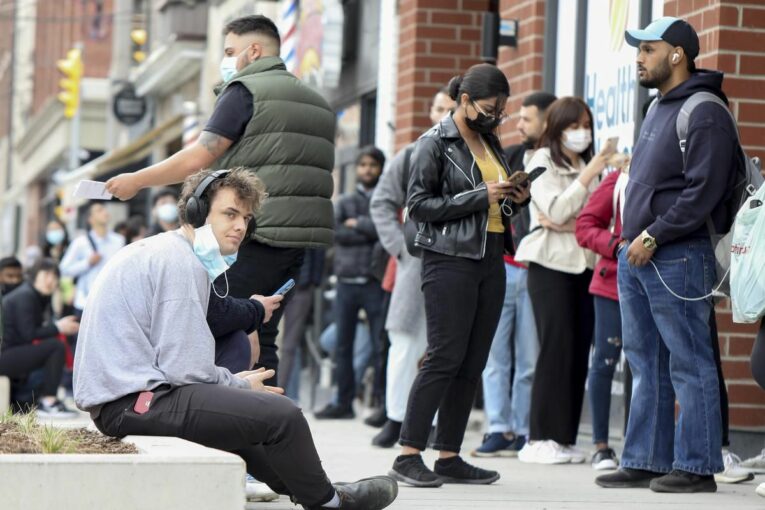
6:30 a.m. Cambodia is lifting its mask mandate for open public places, Prime Minister Hun Sen announced Tuesday.
He cited a large decline in coronavirus cases and a high level of vaccinations in dropping the requirement nationwide.
He said in an audio message on his Facebook page that it is still mandatory to wear masks in indoor public areas, especially air-conditioned buildings and crowded places such as theaters. He said it was up to individuals to decide whether they want to wear masks outdoors.
“I hope that the lifting of the mask-wearing requirement will create a moment of happiness for all our people, and at the same time help them save money by using what they had been paying for masks to instead buy clothing for their children,” he said, speaking after an inter-ministerial meeting to evaluate the COVID-19 situation.
Hun Sen strongly encouraged Cambodians to get booster doses, saying about 6.4 million people still have not received a third, or booster, vaccination.
5:57 a.m. Take-home PCR testing for Ontario students, introduced in the fall as a way to provide easier and faster access, has been phased out with only a dwindling supply of the self-collection kits still available in schools.
With the province in the midst of a sixth wave of the pandemic and pediatric hospital admissions higher than at any point in the pandemic, school boards are receiving only rapid tests instead of PCR (polymerase chain reaction) tests, which are considered the gold standard for diagnosing COVID-19.
What was once a convenient at-school pickup and drop-off PCR testing program has been greatly reduced to a handful of drop-off locations across Toronto. However, all tests continue to be processed.
Read the full story from the Star’s Isabel Teotonio and Ghada Alsharif.
5:55 a.m. China’s capital Beijing is enforcing mass testing and closing down access to neighbourhoods as it seeks to contain a new COVID-19 outbreak.
Announcement of the testing had sparked panic buying in the city of 21 million on Monday, but the situation appeared to calm on Tuesday with public transport largely keeping to normal schedules and roads packed with commuters.
Fears of total lockdown have been fed by disruptions in the supply of food, medicine and daily necessities in the southern business hub of Shanghai, where 25 million residents have only gradually been allowed to leave their homes after three weeks of confinement.
However, 86-year-old Beijing resident Chen Shengzhen said the capital had been given more time to prepare than its southern cousin.
Shanghai’s lockdown “came all of a sudden, so the policies and other aspects were not able to be in place,” leading to short-term hardships in the city, Chen told AP Television News.
“My daughter works in a government department and they have prepared very well, such as beds, quilts, and articles for women’s use. Even if we need to go into lockdown, we will be fine,” said Chen.
Shanghai, which has been locked down for more than two weeks, reported more than 19,000 new infections and 51 deaths in the latest 24-hour period.
5:50 a.m. U.S. President Joe Biden’s administration is taking steps to expand availability of the life-saving COVID-19 antiviral treatment Paxlovid, as it seeks to reassure doctors that there is ample supply for people at high risk of severe illness or death from the virus.
Paxlovid, produced by Pfizer, was first approved in December. Supply of the regimen was initially very limited, but as COVID-19 cases across the country have fallen and manufacturing has increased it is now far more abundant. The White House is now moving to raise awareness of the pill and taking steps to make it easier to access.
The White House said Tuesday it is stepping up outreach to doctors, letting them know that they shouldn’t think twice about prescribing the pill to eligible patients. It is also announcing that the drug will now be distributed directly to pharmacies, in addition to existing distribution channels run by states. That is expected to boost the number of sites from 20,000 to more than 30,000 next week and eventually to 40,000 locations.
The administration believes the pharmacy channel, which it used to boost availability of COVID-19 vaccines more than a year ago, will similarly make the antiviral pills more available to people.
Paxlovid, when administered within five days of symptoms appearing, has been proven to bring about a 90% reduction in hospitalizations and deaths among patients most likely to get severe disease. About 350 Americans are now dying each day from the coronavirus, down from more than 2,600 during the height of the omicron wave earlier this year.
The U.S. has ordered enough supply of the pills for 20 million people, which is estimated to last for several more months. The administration has warned that subsequent deliveries are dependent on Congress approving additional COVID-19 response funding.
You can read more of the news on source



